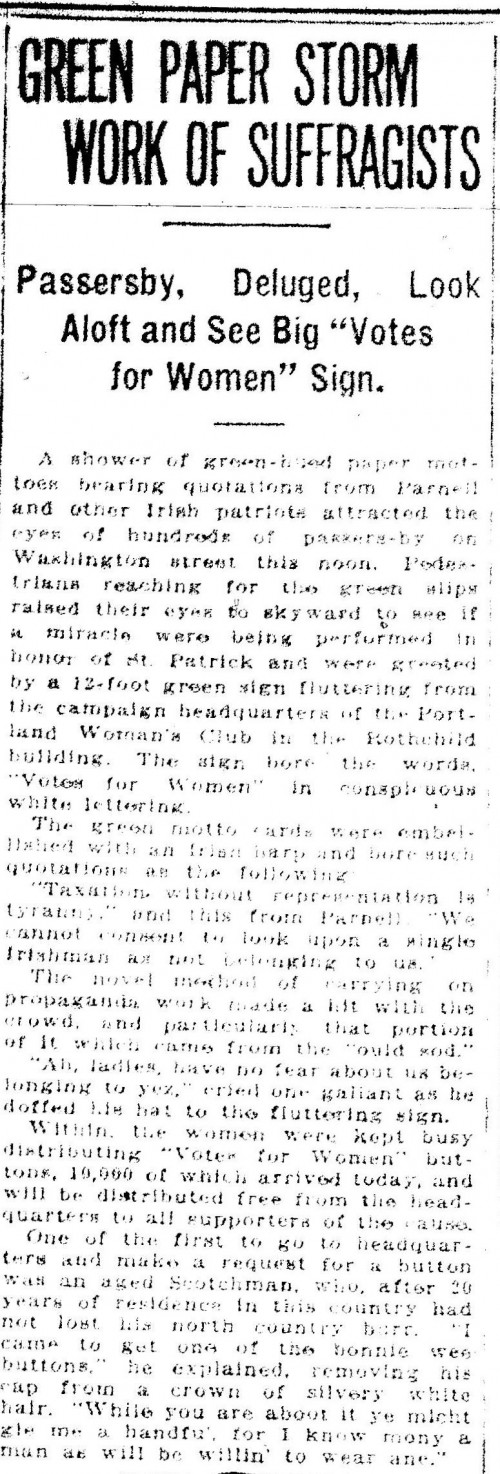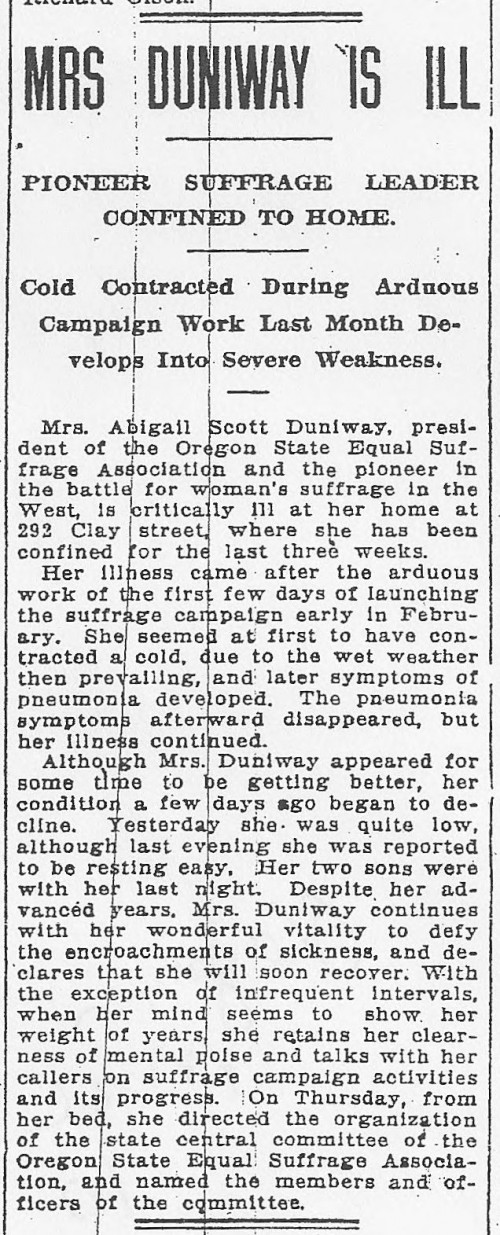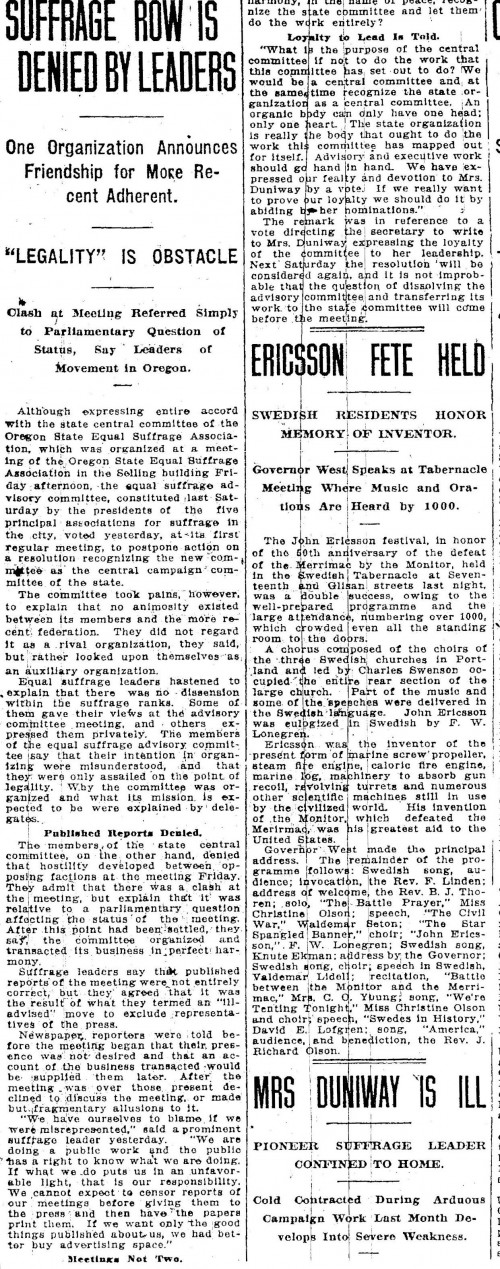SUFFRAGE ROW IS DENIED BY LEADERS
One Organization Announces Friendship for More Recent Adherent.
“LEGALITY” IS OBSTACLE
Clash at Meeting Referred Simply to Parliamentary Question of Status, Say Leaders of Movement in Oregon.
Although expressing entire accord with the state central committee of the Oregon State Equal Suffrage Association, which was organized at a meeting of the Oregon State Equal Suffrage Association in the Selling building Friday afternoon, the equal suffrage advisory committee, constituted last Saturday by the presidents of the five principal associations for suffrage in the city, voted yesterday, at its first regular meeting, to postpone action on a resolution recognizing the new committee as the central campaign committee of the state.
The committee took pains, however, to explain that no animosity existed between its members and the more recent federation. They did not regard it as a rival organization, they said, but rather looked upon themselves as an auxiliary organization.
Equal suffrage leaders hastened to explain that there was no dissension within the suffrage ranks. Some of them gave their views at the advisory committee meeting, and others expressed them privately. The members of the equal suffrage advisory committee say that their intention in organizing were misunderstood, and that they were only assailed on the point of legality. Why the committee was organized and what its mission is expected to be were explained by delegates.
Published Reports Denied.
The members of the state central committee, on the other hand, denied that hostility developed between opposing factions at the meeting Friday. They admit that there was a clash at the meeting, but explain that it was relative to a parliamentary question affecting the status of the meeting. After this point had been settled, they say, the committee organized and transacted its business in perfect harmony.
Suffrage leaders say that published reports of the meeting were not entirely correct, but they agreed that it was the result of what they termed an “ill-advised” move to exclude representatives of the press.
Newspaper reporters were told before the meeting began that their presence was not desired and that an account of the business transacted would be supplied them later. After the meeting was over those present declined to discuss the meeting, or made but fragmentary allusions to it.
“We have ourselves to blame if we were misrepresented,” said a prominent suffrage leader yesterday. “We are doing a public work and the public has a right to know what we are doing. If what we do puts us in an unfavorable light, that is our responsibility. We cannot expect to censor reports of our meetings before giving them to the press and then have the papers print them. If we want only the good things published about us, we had better buy advertising space.”
Meetings Not Two.
As explained in detail yesterday by persons who were present at the formation of the state central committee Friday, the representatives of the various organizations in the committee, and it special officers, were appointed by Mrs. Abigail Scott Duniway, who as president of the state association has that power. After the appointments, calls were issued to those named to meet for the purpose of organizing and the meeting resulted accordingly. Many who came to the gathering did not understand the exact conditions under which it was called, among them the appointive power of Mrs. Duniway, and the discussion followed.
It is denied that those on the list of names given out were chosen at a second meeting, after the first meeting had failed to agree. The first meeting, held in the same room, was an executive meeting of the National College Equal Suffrage League, and entirely independent of the subsequent meeting.
Suffrage Organizations Meet.
At the meeting of the advisory committee yesterday the campaign committee of the Portland Woman’s Club, the Portland Equal Suffrage League and the Men’s Equal Suffrage Club were represented. Members of the National College Equal Suffrage League, the State Equal Suffrage Association and the Woman’s Political Equality League were present and were given the floor, but they were not there as representatives of their organizations.
Mrs. Sarah Evans, chairman of the campaign committee of the Portland Woman’s Club, explained the object of the committee.
“This advisory committee was never intended to be an executive body,” she said. “It was organized simply to confer and compare the work being done by the societies, that they might not be continually clashing and running into each other.”
Some of the speakers explained that the advisory committee had a field of its own, and would in no way affect the State Central Committee, which was to act in the executive capacity and direct the work in the state. Other speakers denied that the advisory committee was a proper organization, saying that it usurped the place of the state organization. They expressed the opinion that it should be dissolved.
Ehrgott Wants Harmony.
Among the latter were Mrs. M. L. T. Hidden, president of the new Political Equality League, and Rev. Albert Ehrgott, president of the executive committee of the new state central committee, who was present as a member of the committee of the Men’s Equal Suffrage Club. A statement by him that the state organization only has a right to call a meeting for a central organization brought forth a retort from Mrs. A. King Wilson, president of the Portland Woman’s Club, who said that the Woman’s Club had merely taken the initiative in issuing the call and that any action taken was by the organizations themselves, all acting with equal powers.
Mrs. Hidden told the members that if both organizations proceeded they would be misunderstood, and would appear before the public as representing two opposing factions.
“What Mrs. Hidden says is true,” said Mr. Ehrgott. “If we’re going to split and have dissension, I shall step out, because I have a great many other things to attend to. We might as well face facts. Why not, in the name of harmony, in the name of peace, recognize the state committee and let them do the work entirely?
Loyalty to Lead is Told.
“What is the purpose of the central committee if not to do the work that this committee has set out to do? We would be a central committee and at the same time recognize the state organization as a central committee. An organic body can only have one head; only one heart. The state organization is really the body that ought to do the work this committee has mapped out for itself. Advisory and executive work should go hand in hand. We have expressed our fealty and devotion to Mrs. Duniway by a vote. If we really want to prove our loyalty we should do it by abiding by her nominations.”
The remark was in reference to a vote directing the secretary to write to Mrs. Duniway expressing the loyalty of the committee to her leadership. Next Saturday the resolution will be considered again, and it is not improbable that the question of dissolving the adivsory committee and transferring its work to the state committee will come before the meeting.






